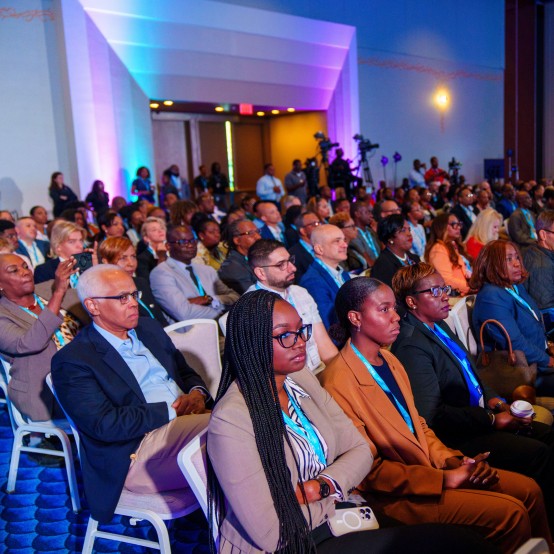


The world is changing rapidly. Technology is evolving at a breakneck speed. These quick and constant changes can be terrifying on a personal and professional level, but the reality is that there are two primary options - learn and evolve or risk getting left behind. This is a very simplified summary of how an aversion to adapting can negatively impact a business, but as the needs and expectations of customers, stakeholders, and communities change, so must the way a company operates - less they risk falling behind their local and global competitors.
...there are two primary options - learn and evolve or risk getting left behind.
This was the overall messaging of the 2024 RF Bahamas Economic Outlook, which took place on March 13 at the Baha Mar Resort. David Slatter, VP of Investments at RF Bank & Trust opened the event, giving a brief synopsis of the conference’s theme - “The Age of Intelligence: Harnessing the Power”. Slatter also highlighted the three key components that would guide the entire conference - acknowledging, understanding, and embracing evolution.
The speakers, which included Kevin Surace, Anu Bradford, Rumman Chowdhury, Dr. James Fletcher, and Jerome Rand balanced the excitement and possibilities of artificial intelligence and its real-world applications, with the ethical principles that guide the use of AI.
Surace showed visible gusto and passion for the creative and practical capabilities of AI, but he acknowledged that this new and rapidly evolving technology can be equal parts thrilling, fascinating, and also terrifying. He likened the advancements in artificial technology innovation to the invention of the wheel replacing brute force, industrial robots replacing manual production lines, and Microsoft Excel programs replacing mathematical calculations done by hand. Initially, there was fear about these inventions replacing the human touch, but over time productivity grew exponentially, while the job functions of men and women simply evolved.
“Every technology that has come along, we thought it was going to take our jobs,” noted Surace. He then went on to highlight that careers and creativity don’t go away. Their roles change with the integration of new tools to bring the vision of people to life - only much faster and cheaper than before. Businesses can technically create - but they will still need that human touch to amplify creativity.
Throughout the conference, members of the business community addressed their concerns and hesitations about incorporating AI into their businesses, but the conversations throughout the day focused on understanding what these tools are, demystifying how they work, becoming educated about available opinions, identifying the importance of finding the right tools to meet customer needs while maximizing output, and most importantly - doing so ethically and securely.
While the RF Bahamas Economic Outlook focused on innovation and technology, it presented a holistic view of topics that impact Bahamian businesses, both locally and on a global scale. Dr. James Fletcher led the conversation about renewable energy and climate change, which impacts every Bahamian. Dr. Fletcher reiterated the vulnerability of the country and the entire Caribbean to rising sea levels, increasing temperatures, and how acidic oceans impact marine life. Dr. Fletcher also took part in a roundtable discussion about the opportunities and potential of carbon credits with the Hon. Ryan Pinder, Attorney General, and Chris Heider of Invert World.
The integration of artificial intelligence is vital for the advancement, growth and survival of businesses. Similarly, climate change may be a frightening prospect and a complicated topic of discussion, but it is imperative that businesses address what needs to be done to adapt, evolve and change to ensure not only the survival of their companies but also the world around them.